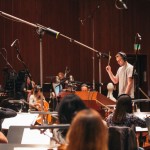A lot of us were left wondering what would become to the Halo series after the trilogy concluded, and I think most were surprised when it was announced that the series would transition into the real-time strategy realm with Halo Wars. I guess most surprising for us music fans is the fact that series composers Marty O’Donnell and Michael Salvatori are nowhere to be found on this project! Don’t worry, though, I’ll gladly vouch for Stephen Rippy, the music and sound director over at Ensemble Studos who handled the game’s score.
So, what has he decided to do with the reins to the Halo series? Well, if you read our review of the Halo Wars Original Soundtrack earlier this month, you already know it’s a whole lot different from the original Halo soundtracks. Rippy discusses his approach to the title, his thoughts on the original Halo scores, stories about working on the title, and touches on his past work and the announced closure of Ensemble Studios.
Read what Stephen Rippy has to say after the jump.
OSV: Thanks for taking the time to talk to us about the upcoming Halo Wars. We’re looking forward to the title. I’m sure the big question on everyone’s mind is how you’ve approached this title given the high-profile of not only the Halo franchise, but also the soundtracks, which were composed by Marty O’Donnell and Michael Salvatori. Was this at all an intimidating undertaking for you?
Rippy: The Halo musical legacy was definitely on my mind. It’s something I tried not to think about too much because I didn’t want to be overwhelmed by it.
OSV: I noticed a distinct rock edge in some of the trailer and developer diary videos. Is this your work?
Rippy: Yes, unless there’s something out there that I’m not aware of. I believe the videos that have been released to this point have pretty much all used demo versions of the cues.
OSV: It sounds more like Halo 2 with its rock influence as opposed to the orchestral style found in Halo 3. What went into the decision to use this style?
Rippy: Before I did any writing, I heard from other members of the team about what, to them, makes the “Halo Sound.” One of the things that popped up consistently was the idea that there’s a lot of rock guitar. In the end, I settled on that style for battle tracks and for some of the world-intro cues; it’s a nice, noticeable contrast from the more ambient music that plays during a lot of the game.
OSV: Will we be hearing a lot of familiar themes from the Halo series?
Rippy: Not a lot, but there are definitely a couple that pop up here and there. It was very important to me to get the feel of the music in the shooters, but I didn’t want to recycle too much actual material. To a large extent, that was a goal of the whole project – we’re really hopeful that Halo Wars will have its own identity within the already established world.
OSV: There are certain pieces of music that have come to define the Halo franchise, and I’m curious as to how you approached these pieces. Was it difficult arranging any of the pieces in such a way as to add your own musical stamp while ensuring they were still recognizable by series fans?
Rippy: Whenever I brought in something from a previous game, I didn’t mess with it too much. They’re almost like cameo appearances. One example of this is the famous Halo monk chant that appears in the middle of “Spirit of Fire,” our main theme. It makes sense in the context of the track and there’s a lot of different stuff going on behind it, but the melody itself is pretty much unchanged from how people are used to hearing it.
OSV: You’ve been with Ensemble Studios for quite some time. Tell us how closely you were able to work with the development team on fine-tuning the game’s audio given your proximity and close relationship with the team?
Rippy: I joined the Halo Wars team fairly late in the game’s development. By the time I started writing, the rest of the audio team was in place and working well – so I didn’t really have much to do with anything but the music. Within that space, though, there was a lot of interaction with the rest of the company about general direction, key pieces, and especially the cinematics.
OSV: Was there a unique sense of excitement while working on this title given the popularity of the franchise?
Rippy: In a general sense, definitely. It was more prevalent at specific moments – if we had a trailer released or did some kind of public demo, for instance – but I think it was always something that people were aware of.
OSV: What tools did you use to create the Halo Wars score?
Rippy: On this game I had a lot of fun with synthesizers, which haven’t really lent themselves to some of our other releases. I’ve got a small vintage collection at home that I dug into, but the main inspiration came from a new Moog Little Phatty that I picked up at the start of writing. I’m not sure, but I don’t think there’s a cue that doesn’t have that instrument in the mix somewhere!
OSV: Will we be hearing any live performances or orchestral recordings, or is the music mostly sample-based?
Rippy: The orchestra and choir parts [Editor’s Note: The FILMharmonic Orchestra and Choir Prague] are all live performances and, although there are lots of electronic elements in the music, almost none of it is sample-based.
OSV: Given that you worked in-house, I take it you had a lengthy period of time to work on the game’s music. How long did it take you to write the score? How many minutes of music did you end up writing?
Rippy: I wrote and recorded everything that I could play myself from April, 2007 through the middle of February, 2008 – after which came several weeks of orchestral sessions and mixing. So the whole thing took just about a year, and I wound up with right around 70 finished minutes.
OSV: There is a 2-disc soundtrack that was released earlier this month that we had the pleasure of reviewing. In most cases, Halo soundtracks have followed their respective game releases by several months, so how did things come together this time around to ensure the soundtrack was out before the game launch?
Rippy: That’s mostly down to the coordination between Microsoft and Sumthing Else Music Works (www.sumthingdigital.com), the company releasing the CD. One thing that possibly helped was that my schedule was driven by a release date for the game that was earlier than what we wound up with – so everything was already finished when we started talking about the soundtrack.
OSV: Were you a fan of the Halo series before working on Halo Wars?
Rippy: Oh, sure – I’d played through the first two games and really enjoyed them. Halo 3 came out in the middle of our development, and I had fun getting through that one as well.
OSV: What does the series mean to you now that you’ve worked so hard on this title? Did you come to learn something new about Marty and Michael’s work that you perhaps weren’t aware of before working on Halo Wars?
Rippy: Well, there were a lot of subtleties that I wasn’t aware of in both the backstory of the Halo universe and the music. If you’re like me and generally play a game through once before moving onto something else, you miss out on how rich the environment can be. It was fun to see what I’d missed!
OSV: To talk a little bit about your past works, I was curious how scoring other strategy games like Age of Empires and Age of Mythology helped you in approaching to Halo Wars. Did this title require a completely new strategy, or were you able to use lessons learned working on these titles?
Rippy: I think everything we’ve done has informed the subsequent games. With Halo Wars, I knew how I wanted the music to be set up, I had a pretty good idea of how long it would take, and it became more a question of, “how do I fit myself into this sound.”
OSV: I’m actually a huge fan of the original Age of Empires, as it was an entirely new game experience. Is there a story behind that score as it still sounds amazing to this day, and has a permanent place on my tiny iPod!
Rippy: Thanks! The music for the first Age of Empires was such fun to do and, looking back on it, it seems like it’s held together with duct tape. My brother and I wrote that together in our spare time. He had a regular day job, and I was still in college; we pretty much divided the work in half and said, “go.” It’s amazing to me that it’s still listened to!
OSV: The music we’ve heard from Halo Wars differs greatly in style compared to what your scores in the past. Is there a particular style that resonates with you?
Rippy: I don’t think so – I like to try and write in different styles whenever I can, anyway.
OSV: Can you tell us about your musical background and how you came to work on games?
Rippy: I’ve been really fortunate to have the opportunities I’ve had, because I’m pretty much self-taught in all of this. I grew up playing music with friends in a garage and making 4-track recordings in my bedroom. That actually gained me enough experience (or maybe misguided confidence!) to pass along a demo tape through my brother to Tony Goodman when Ensemble was first starting up. I believe the music that was on there became the menu screen for Age I, and everything snowballed from there.
OSV: Many of us are still scratching our heads after the announced closure of Ensemble Studios on the heels of the Halo Wars release. I’m sure you have strong feelings about this, but I wanted to ask if there was anything you wanted to say to fans of the studio about your work there, the team, or the games you’ve contributed to.
Rippy: I think just, “thank you.” We’re so lucky that so many people have been interested in what we’ve done. I hope that fans of our work get as much out of Halo Wars as we’ve tried to put into it!
OSV: Can you tell us what’s next for you at this point?
Rippy: I wish I could! Hopefully it will be music, one way or another – check back in a few months!









































